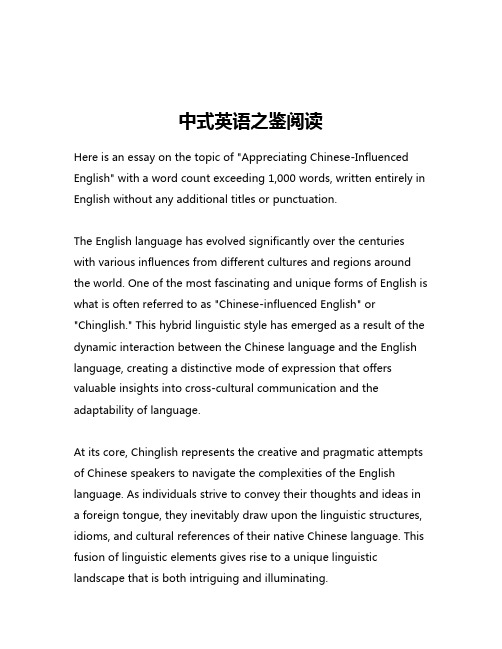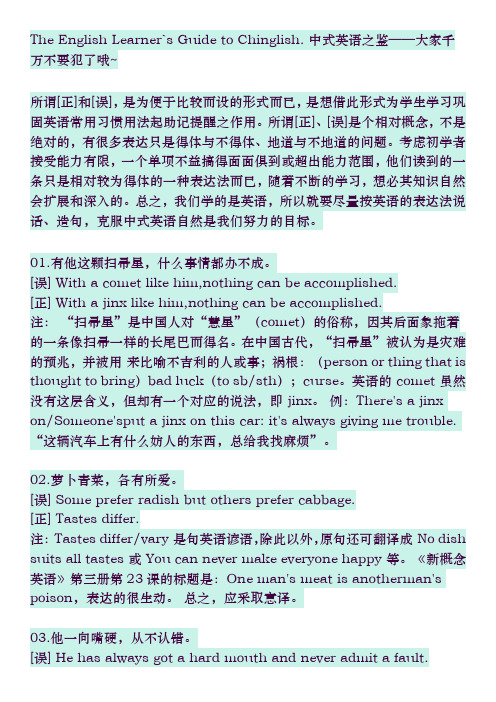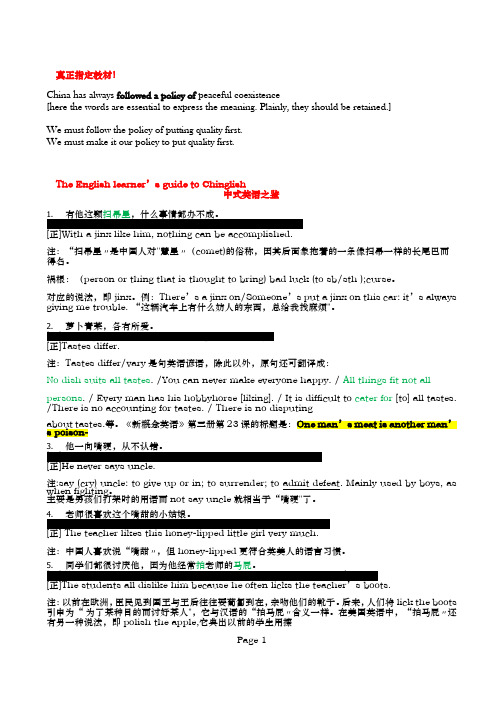中式英语之鉴pdf
中式英语之鉴简介

中式英语之鉴简介The phenomenon of "Chinglish," or Chinese English, is a fascinating blend of two distinct linguistic cultures. It arises when English is used by native Chinese speakers, often resulting in expressions that are influenced by the grammar and syntax of the Chinese language.This linguistic fusion can lead to misunderstandings or awkward phrasing, as the direct translation of certainChinese idioms or phrases may not convey the intended meaning in English. It highlights the importance of cultural and linguistic awareness when learning a new language.Understanding Chinglish is not just about recognizing mistakes; it's also about appreciating the nuances oflanguage learning and the challenges faced by speakers ofnon-native languages. It serves as a reminder that languageis a living, evolving entity, shaped by the people who use it.In an increasingly globalized world, the study ofChinglish can offer insights into cross-cultural communication and the need for clarity in multilingual settings. It's a testament to the adaptability of languageand the creative ways in which people bridge linguistic divides.While some may view Chinglish as a humorous or even problematic aspect of language learning, it is ultimately areflection of the rich diversity that exists within the global English-speaking community. Embracing this diversity can lead to a deeper understanding and appreciation of the world's many languages and cultures.。
中式英语之鉴

中式英语之鉴The English Learner`s Guide to Chinglish01.有他这颗扫帚星,什么事情都办不成。
[误] With a comet like him, nothing can be accomplished.[正] With a jinx like him, nothing can be accomplished.注:“扫帚星”是中国人对“慧星”(comet)的俗称,因其后面象拖着的一条像扫帚一样的长尾巴而得名。
在中国古代,“扫帚星”被认为是灾难的预兆,并被用来比喻不吉利的人或事;祸根:(person or thing that is thought to bring)bad luck(to sb/sth);curse。
英语的comet 虽然没有这层含义,但却有一个对应的说法,即jinx。
例:There's a jinx on/Someone's put a jinx on this car: it's always giving me trouble. “这辆汽车上有什么妨人的东西,总给我找麻烦”。
02.萝卜青菜,各有所爱。
[误] Some prefer radish but others prefer cabbage.[正]Tastes differ.注:Tastes differ/vary 是句英语谚语,除此以外,原句还可翻译成No dish suits all tastes 或You can never make everyone happy 等。
《新概念英语》第三册第23课的标题是:One man's meat is another man's poison,表达的很生动。
总之,应采取意译。
03.他一向嘴硬,从不认错。
[误] He has always got a hard mouth and never admit a fault.[正] He never says uncle.注:say (cry) uncle: to give up or in; to surrender; to admit defeat. Mainly used by boys, as when fighting。
中式英语之鉴阅读

中式英语之鉴阅读Here is an essay on the topic of "Appreciating Chinese-Influenced English" with a word count exceeding 1,000 words, written entirely in English without any additional titles or punctuation.The English language has evolved significantly over the centuries with various influences from different cultures and regions around the world. One of the most fascinating and unique forms of English is what is often referred to as "Chinese-influenced English" or "Chinglish." This hybrid linguistic style has emerged as a result of the dynamic interaction between the Chinese language and the English language, creating a distinctive mode of expression that offers valuable insights into cross-cultural communication and the adaptability of language.At its core, Chinglish represents the creative and pragmatic attempts of Chinese speakers to navigate the complexities of the English language. As individuals strive to convey their thoughts and ideas in a foreign tongue, they inevitably draw upon the linguistic structures, idioms, and cultural references of their native Chinese language. This fusion of linguistic elements gives rise to a unique linguistic landscape that is both intriguing and illuminating.One of the most prominent features of Chinglish is the direct translation of Chinese idioms and expressions into English. This process, known as "literal translation," often results in phrases that may seem nonsensical or humorous to native English speakers, but which carry profound meaning and cultural significance in the Chinese context. For instance, the Chinglish phrase "the old man under the tree" might be a direct translation of the Chinese idiom "树下老人," which refers to a wise and experienced individual who imparts valuable knowledge and guidance. Similarly, the expression "to add oil" in Chinglish is a literal translation of the Chinese phrase "加油," which is used to encourage and motivate others. These linguistic quirks not only highlight the differences between the two languages but also offer a glimpse into the unique worldviews and cultural perspectives of Chinese speakers.Moreover, Chinglish often reflects the influence of Chinese grammatical structures on the usage of English. Chinese is a language that is characterized by its conciseness and the omission of certain grammatical elements, such as articles and pronouns. When Chinese speakers translate these linguistic features directly into English, the result can be sentences that appear incomplete or unconventional to native English speakers. For example, the Chinglish phrase "I go to school" might be a direct translation of the Chinese sentence "我去上学," where the pronoun "I" and the article"the" are omitted. While this construction may seem unnatural in standard English, it reflects the underlying logic and linguistic patterns of the Chinese language.Interestingly, Chinglish also showcases the creative and adaptive nature of language. As Chinese speakers grapple with the challenges of expressing themselves in English, they often develop novel ways of using words and phrases that defy the conventional norms of the language. This linguistic creativity can be seen in the coining of new terms, the repurposing of existing words, and the blending of Chinese and English elements. For instance, the term "self-service" in Chinglish might be used to refer to a situation where an individual is expected to take care of their own needs, rather than relying on the assistance of others. This innovative usage of the term "self-service" reflects the practical and resourceful mindset of Chinese speakers as they navigate the linguistic landscape of English.Furthermore, Chinglish can be seen as a testament to the resilience and adaptability of the English language. As it encounters and assimilates influences from diverse cultural and linguistic backgrounds, English demonstrates its remarkable capacity to evolve and accommodate new forms of expression. The emergence of Chinglish not only enriches the global tapestry of English but also highlights the language's ability to serve as a medium for cross-cultural exchange and understanding.In the realm of business and international communication, Chinglish can play a crucial role in bridging cultural divides and facilitating effective dialogue. As Chinese companies and individuals engage with the global marketplace, their use of Chinglish can provide valuable insights into their thought processes, cultural references, and communication styles. By understanding and appreciating the nuances of Chinglish, native English speakers can cultivate a deeper appreciation for the cultural context and perspectives of their Chinese counterparts, ultimately leading to more productive and meaningful exchanges.Moreover, the study of Chinglish can offer valuable lessons in language learning and intercultural communication. By examining the patterns and mechanisms underlying Chinglish, linguists and educators can gain valuable insights into the challenges and strategies employed by language learners. This knowledge can inform the development of more effective language teaching methodologies and materials, helping to bridge the gap between the Chinese and English languages and fostering greater cross-cultural understanding.In conclusion, the phenomenon of Chinglish is a fascinating and multifaceted aspect of the English language. It represents the creative and adaptive efforts of Chinese speakers to navigate thelinguistic landscape of English, while also reflecting the rich cultural heritage and unique perspectives of the Chinese language. By appreciating and studying Chinglish, we can gain a deeper understanding of the dynamic interplay between language and culture, and the remarkable resilience and adaptability of the English language as it continues to evolve and embrace diverse influences from around the world.。
《中式英语之鉴》电子版

The English Learner`s Guide to Chinglish. 中式英语之鉴——大家千万不要犯了哦~所谓[正]和[误],是为便于比较而设的形式而已,是想借此形式为学生学习巩固英语常用习惯用法起助记提醒之作用。
所谓[正]、[误]是个相对概念,不是绝对的,有很多表达只是得体与不得体、地道与不地道的问题。
考虑初学者接受能力有限,一个单项不益搞得面面俱到或超出能力范围,他们读到的一条只是相对较为得体的一种表达法而已,随着不断的学习,想必其知识自然会扩展和深入的。
总之,我们学的是英语,所以就要尽量按英语的表达法说话、造句,克服中式英语自然是我们努力的目标。
01.有他这颗扫帚星,什么事情都办不成。
[误] With a comet like him,nothing can be accomplished.[正] With a jinx like him,nothing can be accomplished.注:“扫帚星”是中国人对“慧星”(comet)的俗称,因其后面象拖着的一条像扫帚一样的长尾巴而得名。
在中国古代,“扫帚星”被认为是灾难的预兆,并被用来比喻不吉利的人或事;祸根:(person or thing that is thought to bring)bad luck(to sb/sth);curse。
英语的 comet 虽然没有这层含义,但却有一个对应的说法,即 jinx。
例:There's a jinxon/Someone'sput a jinx on this car: it's always giving me trouble. “这辆汽车上有什么妨人的东西,总给我找麻烦”。
02.萝卜青菜,各有所爱。
[误] Some prefer radish but others prefer cabbage.[正] Tastes differ.注: Tastes differ/vary 是句英语谚语,除此以外,原句还可翻译成 No dish suits all tastes 或 You can never make everyone happy 等。
中式英语之鉴第十二部分

Two sentences needed to be connected logically require coordinating conjunctions. E.g. Luo‘s art is based on traditional techniques, but he does not allow himself to be restricted by tradition. (two independent clauses) Luo‘s art is based on traditional techniques. But he does not allow himself to be restricted by tradition. (two sentences)
The problem of Chinese translators is that running less risk of sprinkling a text with too many ―however‖s and ―moreover‖s than of failing to insert enough of conjunctions to provide coherence.
The Translator’s Guide to Chinglish
ΧΙΙ. Logical Connectives
制作人: 李洁 宋锦霞 李雨涵 刘天凤 刘思雨
We talked many about unnecessary words and sentence structure before. Then, let‘s think something about the logical connectives. A logical connective (also called a logical operator) is a symbol or word used to connect two or more sentences (of either a formal or a natural language) in a grammatically valid way, such that the sense of the compound sentence produced depends only on the original sentences.
中式英语之鉴第十二部分课件(1)

中式英语之鉴第十二部分课件一、教学内容本节课我们将深入探讨中式英语的特点及误区,以《中式英语之鉴》教材第十二部分为主要教学内容。
具体包括教材的第三章“常见句型误区”中的第46节,详细内容涉及了中式英语的时态误用、词汇搭配错误以及句子结构问题。
二、教学目标1. 理解并掌握中式英语常见的误区及其原因;2. 学会正确运用英语时态、词汇搭配和句子结构;3. 提高学生的英语表达能力,避免中式英语的干扰。
三、教学难点与重点教学难点:正确运用英语时态、词汇搭配和句子结构。
教学重点:识别并纠正中式英语的常见误区。
四、教具与学具准备1. 教师准备:PPT课件、教材、黑板、粉笔;2. 学生准备:教材、笔记本、练习本。
五、教学过程1. 导入:通过展示一段中式英语的对话,让学生找出其中的错误,引出本节课的主题。
2. 新课内容:讲解教材第三章第46节的内容,分析中式英语的误区,提供正确表达方式。
a. 时态误用:通过例句对比,让学生了解并掌握不同时态的正确使用方法。
b. 词汇搭配错误:分析常见的词汇搭配错误,引导学生学会正确搭配。
c. 句子结构问题:讲解英语的基本句型结构,让学生学会构建正确的句子。
3. 随堂练习:针对每个知识点设计练习题,让学生及时巩固所学内容。
4. 小组讨论:分组讨论生活中遇到的中式英语现象,分享经验和感悟。
六、板书设计1. 中式英语之鉴(第十二部分)2. 内容:a. 时态误用:例句对比、正确用法b. 词汇搭配错误:常见错误、正确搭配c. 句子结构问题:基本句型结构、正确表达七、作业设计1. 作业题目:a. 根据所给句子,改正其中的时态错误;b. 选择正确的词汇搭配填空;c. 仿照例句,用正确的句子结构表达相同的意思。
2. 答案:见附件。
八、课后反思及拓展延伸2. 拓展延伸:鼓励学生在课后收集生活中的中式英语例子,进行分析和改正,提高英语水平。
同时,推荐阅读相关书籍,深入了解中式英语的成因及避免方法。
重点和难点解析:1. 教学难点与重点的识别;2. 教学过程中的实践情景引入、例题讲解和随堂练习;3. 作业设计中的题目和答案的详细性与实用性;4. 课后反思及拓展延伸的深度与广度。
中式英语之鉴from-nowhere

真正指定教材!China has always followed a policy of peaceful coexistence[here the words are essential to express the meaning. Plainly, they should be retained.]We must follow the policy of putting quality first.We must make it our policy to put quality first.The English learner’s guide to Chinglish中式英语之鉴1.有他这颗扫帚星,什么事情都办不成。
[误]With a comet like him, nothing can be accomplished.[正]With a jinx like him, nothing can be accomplished.注:“扫帚星〃是中国人对''慧星〃(comet)的俗称,因其后面象拖着的一条像扫帚一样的长尾巴而得名。
祸根:(person or thing that is thought to bring) bad luck (to sb/sth );curse。
对应的说法,即 jinx。
例:There’s a jinx on/Someone’s put a jinx on this car: it’s always giving me trouble. “这辆汽车上有什么妨人的东西,总给我找麻烦"。
2.萝卜青菜,各有所爱。
[误] Some prefer radish but others prefer cabbage.[正]Tastes differ.注:Tastes differ/vary是句英语谚语,除此以外,原句还可翻译成:No dish suits all tastes. /You can never make everyone happy. / All things fit not all persons. / Every man has his hobbyhorse [liking]. / It is difficult to cater for [to] all tastes. /There is no accounting for tastes. / There is no disputingabout tastes.等。
thetranslator’sguidetochinglish《中式英语之鉴》joanpinkham外语教学与研究出版社

The Translator’s Guide to Chinglish 《中式英语之鉴》Joan Pinkham 外语教学与研究出版社Unnecessary nouns:1) redundant (the meaning is included or implied in other parts of the sentence)A: to accelerate the pace of economic reformB: to accelerate economic reformA: there have been good harvests in agricultureB: there have been good harvestsA: living standards for the people in both urban and rural areas continued to riseB: living standards in both urban and rural areas continued to rise2) category nounsA: promoting the cause of peaceful reunificationB: promoting peaceful reunificationA: this, coupled with the factor of price instability, caused……B: this, coupled with price instability, caused……? Unnecessary verbs:A:It is impossible for us to accomplish the transformation of the whole society overnight.B: It is impossible for us to transform the whole society overnight.A: they should conduct a careful examination of ….B: they should carefully examine…..A: until China realizes industrial modernizationB: until China modernizes its industry?More unnecessary verbs:To give guidance to = to guideTo provide assistance to = to assistTo carry out the struggle against = to struggle againstTo conduct reform = to reformTo engage in free discussion of = to discuss freelyTo place stress on = to stressTo exercise control over = to control?Unnecessary verb phrasesA: it is especially necessary to make great efforts to assimilate the achievements of other culturesB: it is especially necessary to assimilate the achievements of other culturesA: all enterprises must pay attention to promoting excellent workersB: all enterprises must see to it that excellent workers arepromoted?Unnecessary modifiersA: that theory too is a valuable ideological treasure of the PartyB: that theory too is an ideological treasure of the Party A: Singapore will bar America’s popular female pop star Madonna from staging a show in its territoryB: Singapore will bar America’s pop star Madonna from staging a show in its territoryA: now the government is working hard to improve taxation B: the government is working hard to improve taxationA: previously we used to overemphasize the need for class struggleB: we used to overemphasize the need for class struggleA: hundreds of transnational firms have started various businesses in ChinaB: hundreds of transnational firms have started businesses in ChinaA: imports of foreign automobiles have declined sharply this yearB: imports of automobiles have declined sharply this year。
